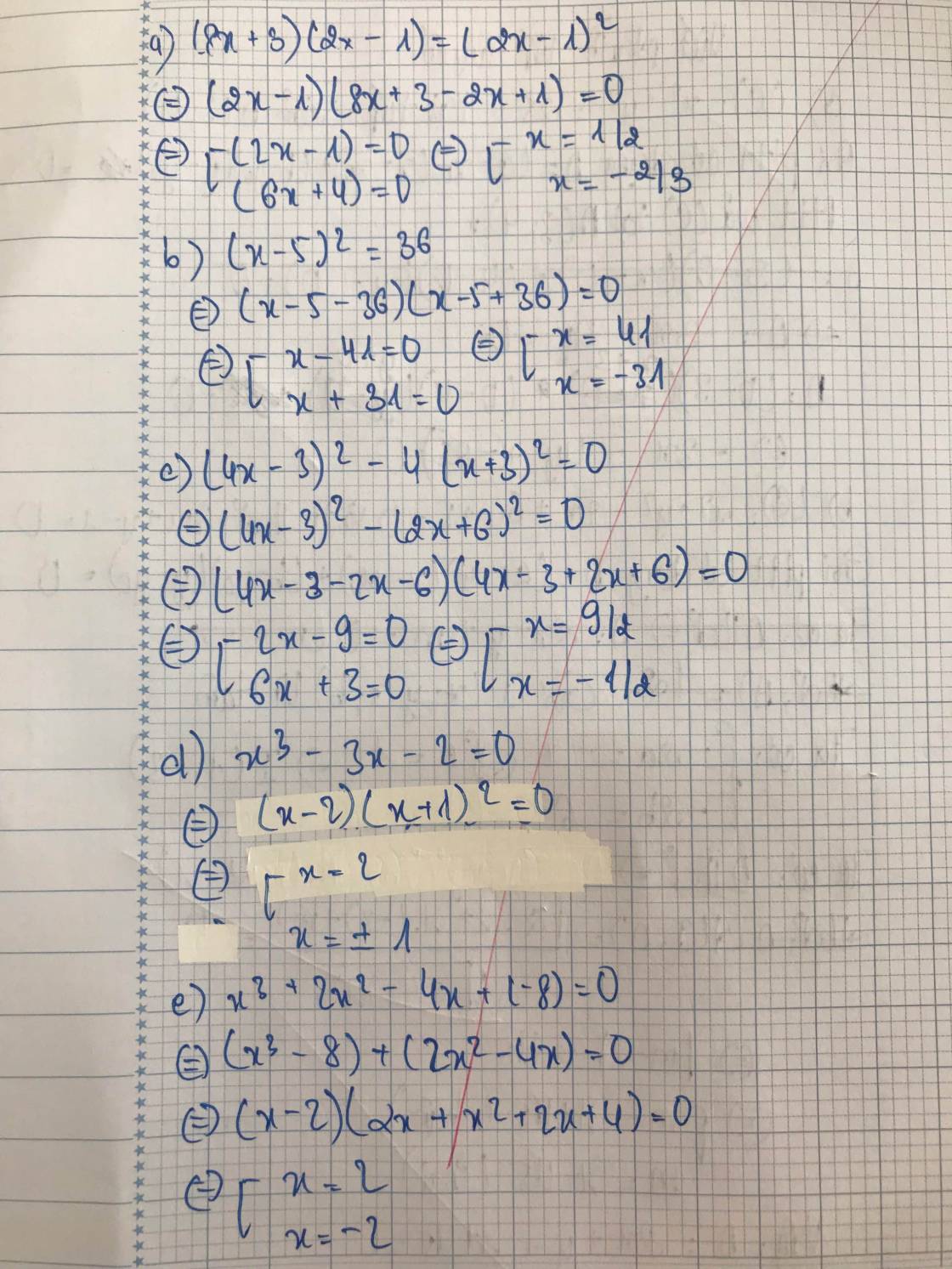x ( 5\(x3\)+2) -2(\(\sqrt{2x+1}\)-1 ) =0
Hãy nhập câu hỏi của bạn vào đây, nếu là tài khoản VIP, bạn sẽ được ưu tiên trả lời.


a)
\(=\left(x+2y\right)\left(x^2-xy+y^2\right)-3xy\left(x+2y\right)\)
\(=\left(x+2y\right)\left(x^2-xy+y^2-3xy\right)\)
\(=\left(x+2y\right)\left(x^2-2xy+y^2\right)\)
\(=\left(x+2\right)\left(x-2\right)^2\)
b)
\(3x\left(2x-1\right)\left(2x+1\right)=0\)
3x=0 =>x=0
hoặc 2x-1=0 => 2x=1=>x=1/2
hoặc 2x+1=0=>2x=-1=>x=-1/2

\(a,\Leftrightarrow x\left(2x-7\right)+2\left(2x-7\right)=0\\ \Leftrightarrow\left(x+2\right)\left(2x-7\right)=0\Leftrightarrow\left[{}\begin{matrix}x=-2\\x=\dfrac{7}{2}\end{matrix}\right.\\ b,\Leftrightarrow x\left(x^2-9\right)=0\\ \Leftrightarrow x\left(x-3\right)\left(x+3\right)=0\Leftrightarrow\left[{}\begin{matrix}x=0\\x=3\\x=-3\end{matrix}\right.\\ c,\Leftrightarrow\left(2x-1\right)\left(2x+1\right)-2\left(2x-1\right)^2=0\\ \Leftrightarrow\left(2x-1\right)\left(2x+1-4x+2\right)=0\\ \Leftrightarrow\left(2x-1\right)\left(-2x+3\right)=0\Leftrightarrow\left[{}\begin{matrix}x=\dfrac{1}{2}\\x=\dfrac{3}{2}\end{matrix}\right.\\ d,\Leftrightarrow x^2\left(x-1\right)-4\left(x-1\right)^2=0\\ \Leftrightarrow\left(x-1\right)\left(x^2-4x+4\right)=0\\ \Leftrightarrow\left(x-1\right)\left(x-2\right)^2=0\Leftrightarrow\left[{}\begin{matrix}x=1\\x=2\end{matrix}\right.\)

1.
\(\lim\limits_{x\to +\infty}(x^3+3x^2+2)=+\infty\)
2.
\(\lim\limits_{x\to -\infty}\sqrt{4x^2-x+5}=\lim\limits_{x\to -\infty}-x.\sqrt{4+\frac{1}{x}+\frac{5}{x^2}}=+\infty\) do $-x\to +\infty$ và $\lim\limits_{x\to -\infty}\sqrt{4+\frac{1}{x}+\frac{5}{x^2}}=4>0$
3.
\(\lim\limits_{x\to +\infty}(\sqrt{x^2-2x-1}-\sqrt{x^2-7x+3})=\lim\limits_{x\to +\infty}\frac{x^2-2x-1-(x^2-7x+3)}{\sqrt{x^2-2x-1}+\sqrt{x^2-7x+3}}\)
\(=\lim\limits_{x\to +\infty}\frac{5x-4}{\sqrt{x^2-2x-1}+\sqrt{x^2-7x+3}}=\lim\limits_{x\to +\infty}\frac{5-\frac{4}{x}}{\sqrt{1-\frac{2}{x}-\frac{1}{x^2}}+\sqrt{1-\frac{7}{x}+\frac{3}{x^2}}}\)
\(=\frac{5}{1+1}=\frac{5}{2}\)

a) (2x - 5)2 - (5 + 2x) = 0
<=> 4x2 - 22x + 20 = 0
\(\Leftrightarrow\left(2x-\dfrac{11}{2}\right)^2=\dfrac{41}{4}\)
\(\Leftrightarrow x=\dfrac{\pm\sqrt{41}+11}{4}\)
b) \(27x^3-54x^2+36x=0\)
\(\Leftrightarrow x\left(3x^2-6x+4\right)=0\)
\(\Leftrightarrow x=0\) (Vì \(3x^2-6x+4=3\left(x-1\right)^2+1>0\forall x\))
c) x3 + 8 - (x + 2).(x - 4) = 0
\(\Leftrightarrow\left(x+2\right).\left(x^2-2x+4\right)-\left(x+2\right)\left(x-4\right)=0\)
\(\Leftrightarrow\left(x+2\right)\left(x^2-3x+8\right)=0\)
\(\Leftrightarrow x=-2\) (Vì \(x^2-3x+8=\left(x-\dfrac{3}{2}\right)^2+\dfrac{23}{4}>0\))
d) \(x^6-1=0\)
\(\Leftrightarrow\left(x^2\right)^3-1=0\)
\(\Leftrightarrow\left(x^2-1\right)\left(x^4+x^2+1\right)=0\)
\(\Leftrightarrow x^2-1=0\) (Vì \(x^4+x^2+1>0\))
\(\Leftrightarrow x=\pm1\)
\(d,x^6-1=0\\ \Leftrightarrow\left(x^2\right)^3-1^3=0\\ \Leftrightarrow\left(x^2-1\right)\left(x^4+x^2+1\right)=0\\ \Leftrightarrow\left(x-1\right)\left(x+1\right)\left(x^4+x^2+1\right)=0\\ \Leftrightarrow\left[{}\begin{matrix}x-1=0\\x+1=0\\x^4+x^2+1=0\left(Vô.lí,vì:x^4\ge0;x^2\ge0,\forall x\in R\right)\end{matrix}\right.\\ \Leftrightarrow\left[{}\begin{matrix}x=1\\x=-1\end{matrix}\right.\\ c,\left(x^3+8\right)-\left(x+2\right)\left(x-4\right)=0\\ \Leftrightarrow\left(x^3+8\right)-\left(x^2-2x-8\right)=0\\ \Leftrightarrow x^3-x^2+2x+16=0\\ \Leftrightarrow x^3+2x^2-3x^2-6x+8x+16=0\\ \Leftrightarrow x^2\left(x+2\right)-3x\left(x+2\right)+8\left(x+2\right)=0\\ \Leftrightarrow\left(x^2-3x+8\right)\left(x+2\right)=0\\ \Leftrightarrow\left[{}\begin{matrix}x^2-3x+8=0\left(Vô.lí\right)\\x+2=0\end{matrix}\right.\Leftrightarrow x=-2\)

a) x = 1; x = - 1 3 b) x = 2.
c) x = 3; x = -2. d) x = -3; x = 0; x = 2.

√(x² + x + 1) = 1
⇔ x² + x + 1 = 1
⇔ x² + x = 0
⇔ x(x + 1) = 0
⇔ x = 0 hoặc x + 1 = 0
*) x + 1 = 0
⇔ x = -1
Vậy x = 0; x = -1
--------------------
√(x² + 1) = -3
Do x² ≥ 0 với mọi x
⇒ x² + 1 > 0 với mọi x
⇒ x² + 1 = -3 là vô lý
Vậy không tìm được x thỏa mãn yêu cầu
--------------------
√(x² - 10x + 25) = 7 - 2x
⇔ √(x - 5)² = 7 - 2x
⇔ |x - 5| = 7 - 2x (1)
*) Với x ≥ 5, ta có
(1) ⇔ x - 5 = 7 - 2x
⇔ x + 2x = 7 + 5
⇔ 3x = 12
⇔ x = 4 (loại)
*) Với x < 5, ta có:
(1) ⇔ 5 - x = 7 - 2x
⇔ -x + 2x = 7 - 5
⇔ x = 2 (nhận)
Vậy x = 2
--------------------
√(2x + 5) = 5
⇔ 2x + 5 = 25
⇔ 2x = 20
⇔ x = 20 : 2
⇔ x = 10
Vậy x = 10
-------------------
√(x² - 4x + 4) - 2x +5 = 0
⇔ √(x - 2)² - 2x + 5 = 0
⇔ |x - 2| - 2x + 5 = 0 (2)
*) Với x ≥ 2, ta có:
(2) ⇔ x - 2 - 2x + 5 = 0
⇔ -x + 3 = 0
⇔ x = 3 (nhận)
*) Với x < 2, ta có:
(2) ⇔ 2 - x - 2x + 5 = 0
⇔ -3x + 7 = 0
⇔ 3x = 7
⇔ x = 7/3 (loại)
Vậy x = 3
1)
\(\Leftrightarrow x^2+x+1=1^2=1\\ \Leftrightarrow x^2+x=0\\ \Leftrightarrow x\left(x+1\right)=0\\ \Rightarrow\left\{{}\begin{matrix}x=0\\x=-1\end{matrix}\right.\)
2) Do \(x^2+1>0\forall x\) nên \(x\in\varnothing\)
3)
\(\Leftrightarrow\sqrt{\left(x-5\right)^2}=7-2x\\ \Leftrightarrow\left|x-5\right|=7-2x\)
Nếu \(x\ge5\) thì
\(\Leftrightarrow x-5-7+2x=0\\ \Leftrightarrow3x-12=0\\ \Leftrightarrow3x=12\\ \Rightarrow x=4\)
=> Loại trường hợp này
Nếu \(x< 5\) thì
\(\Leftrightarrow5-x-7+2x=0\\ \Leftrightarrow x-2=0\\ \Rightarrow x=2\)
=> Nhận trường hợp này
Vậy x = 2
4)
\(\Leftrightarrow2x+5=5^2=25\\ \Leftrightarrow2x=25-5=20\\ \Rightarrow x=\dfrac{20}{2}=10\)
5)
\(\Leftrightarrow\sqrt{\left(x-2\right)^2}-2x+5=0\\ \Leftrightarrow\left|x-2\right|-2x+5=0\)
Nếu \(x\ge2\) thì
\(\Leftrightarrow x-2-2x+5=0\\ \Leftrightarrow3-x=0\\ \Rightarrow x=3\)
=> Nhận trường hợp này
Nếu \(x< 2\) thì
\(\Leftrightarrow2-x-2x+5=0\\ \Leftrightarrow7-3x=0\\ \Leftrightarrow3x=7\\ \Rightarrow x=\dfrac{7}{3}\)
=> Loại trường hợp này
Vậy x = 3

Bài 2:
a: \(\Leftrightarrow2x^2-10x-3x-2x^2=26\)
=>-13x=26
hay x=-2
b: \(\Leftrightarrow\left(x-1\right)\left(5x-1\right)=0\)
hay \(x\in\left\{1;\dfrac{1}{5}\right\}\)
c: \(\Leftrightarrow\left(x+5\right)\left(2-x\right)=0\)
hay \(x\in\left\{-5;2\right\}\)

1. ĐKXĐ: $x\geq 4$
PT $\Leftrightarrow \sqrt{x-1}=5-\sqrt{x-4}$
$\Rightarrow x-1=25+x-4-10\sqrt{x-4}$
$\Leftrightarrow 22=10\sqrt{x-4}$
$\Leftrightarrow 2,2=\sqrt{x-4}$
$\Leftrightarrow 4,84=x-4\Leftrightarrow x=8,84$
(thỏa mãn)
2. ĐKXĐ: $x\geq 0$
PT $\Leftrightarrow (2x-2\sqrt{x})-(5\sqrt{x}-5)=0$
$\Leftrightarrow 2\sqrt{x}(\sqrt{x}-1)-5(\sqrt{x}-1)=0$
$\Leftrightarrow (\sqrt{x}-1)(2\sqrt{x}-5)=0$
$\Leftrightarrow \sqrt{x}-1=0$ hoặc $2\sqrt{x}-5=0$
$\Leftrightarrow x=1$ hoặc $x=\frac{25}{4}$ (tm)
3. ĐKXĐ: $x\geq 3$
Bình phương 2 vế thu được:
$3x-2+2\sqrt{(2x+1)(x-3)}=4x$
$\Leftrightarrow 2\sqrt{(2x+1)(x-3)}=x+2$
$\Leftrightarrow 4(2x+1)(x-3)=(x+2)^2$
$\Leftrightarrow 4(2x^2-5x-3)=x^2+4x+4$
$\Leftrightarrow 7x^2-24x-16=0$
$\Leftrightarrow (x-4)(7x+4)=0$
Do $x\geq 3$ nên $x=4$
Thử lại thấy thỏa mãn
Vậy $x=4$

ĐK: \(x\ge\frac{-1}{2}\). Ta viết lại phương trình thành:
\(5x^4+\left(2x+1-2\sqrt{2x+1}+1\right)=0\)\(\Leftrightarrow5x^4+\left(\sqrt{2x+1}-1\right)^2=0\Leftrightarrow\hept{\begin{cases}x=0\\\sqrt{2x+1}-1=0\end{cases}}\)
=> x=0 là nghiệm của phương trình